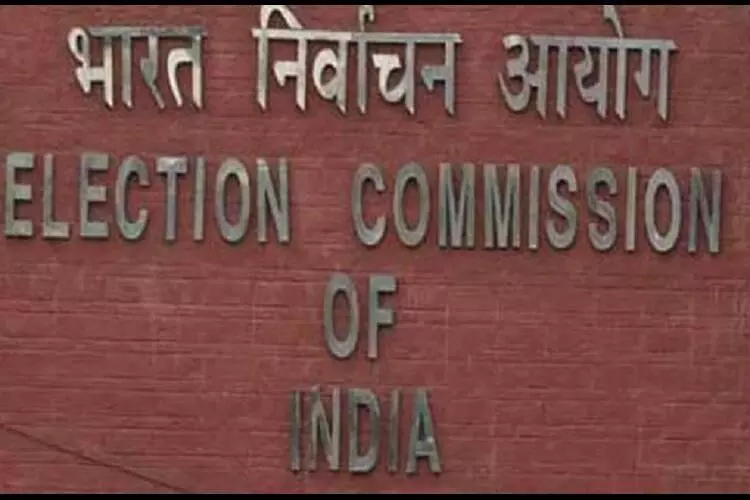AP Elections 2024: Voter registration from Oct 17 till Nov 30; final list on January 5, 2024
The Chief Electoral Officer further said that the final list of electoral rolls would be published on January 5, 2024

Election Commission of India (ECI)
AMARAVATI: All voters and eligible individuals who will be 18 on January 1, 2023, according to Andhra Pradesh Chief Electoral Officer Mukesh Kumar Meena, can register to cast their votes from October 17 through November 30, 2023.
During a press conference that was held on Monday at the AP Secretariat's Publicity Cell, Chief Electoral Officer Mukesh Kumar Meena said every individual/voters should give accurate information in all fields of the applicable Form-6, 7, 8, and 8A when completing their applications.
The Chief Electoral Officer further said that the final list of electoral rolls would be published on January 5, 2024. The Election Commission of India has decided to carry out an annual summary revision with reference to January 1, 2024, as the qualifying date.
Mukesh Kumar Meena said, house-to-house verification by booth-level officers(BLOS) would be from July 21–August 21, 2023. The BLOS would visit every house for verification of the details of electors from the head of the family, he added.
The BLOs would also collect information such as un-enrolled eligible individuals, prospective electors, multiple entries/dead/electors/permanently moved electors, and ER entry corrections.
Rationalisation of polling stations and formation of sections
- Physical verification of the polling station location would be undertaken to determine whether the building is in adequate condition and meets other criteria established by the Commission for the smooth conduct of the election.
- The District Election Officer(DEO) would appoint a senior officer to do the physical verification.
- Polling stations with more than 1,500 voters would be rationalized.
- The grouping of all family members and neighbours in a portion, as well as maintaining uniformity of addresses in ER and EPICs, would be implemented.
- To standardise elector addresses, fields such as H.No./Flat No./Door No., Ward No., Street, Area/Locality Village/Town/City, District, and so on would be kept while preparing the roll, said the Chief Electoral Officer.
- Where no house number as given by the Panchayat / Municipal authorities are available, the notional number would be given in the roll
- The voters would be grouped in roll order by House number.
The fulfilment of the following conditions would be ensured while building a new polling station or re-organizing existing polling stations by creating/merging/attaching parts to nearby polling stations
- No family is broken and all the family members are kept in the same section and at the same place
- Electors residing in a building are enrolled in the same part.
- As far as possible electors residing in a Street are enrolled in the same part.
- The electors of so merged/attached polling stations are not required to travel for more than two kilometer distance and to cross any natural barriers.
Major disparities in the elector-population ratio, gender ratio, age, cohort imbalances, notably in the 18-19 age group, and abnormal increases or decreases in the number of electors in the area would be investigated. Following the identification of important gaps, solutions for closing the gaps would be devised, according to the Mukesh Kumar Meena.
Meeting with Political Parties and sharing of electoral rolls
- All District Election Officers / Electoral Registration Officers would meet with political parties on a regular basis to solicit their involvement in the revision process by selecting Booth Level Agents (BLAs).
- Two copies of the draft / final roll, as well as the lists of claims and objections, would be distributed with recognised political parties, in accordance with the law.
- ERO would also make a list of claims and objections available to all political parties on a weekly basis.
- To assist stakeholders and increase transparency in the electoral registration process, all application forms received in Forms 6, 6A, 7, and 8 would be published on the CEO website on a daily basis.
- Special campaign dates for filing claims and objections have been set for October 28 and 29, as well as November 18 and 19 (Saturdays and Sundays). During these days, the BLO of each polling station, as well as the booth level agent selected by the political parties, will be available.
- They would check through the voter lists and identify any corrections, as well as receive applications, guide applicants, and clear their names at the polling station.
Display of list of claims and objections
- The list of claims and objections would be prepared by the Electoral Registration Officer (ERO). Furthermore, a list of all claims received would be published on the CEO's website so that citizens can review it and file complaints with the appropriate ERO.
- ERO would make a list of claims and objections available to all political parties on a weekly basis. The ERO would organise frequent meetings of all political parties and personally hand over the list of claims and objections to them, obtaining acknowledgement.



